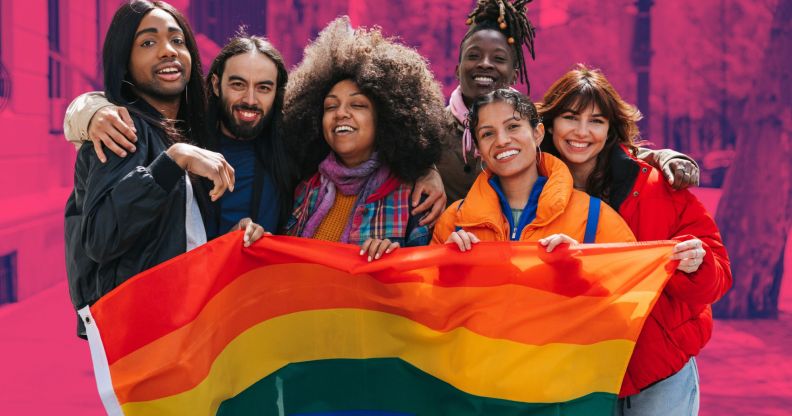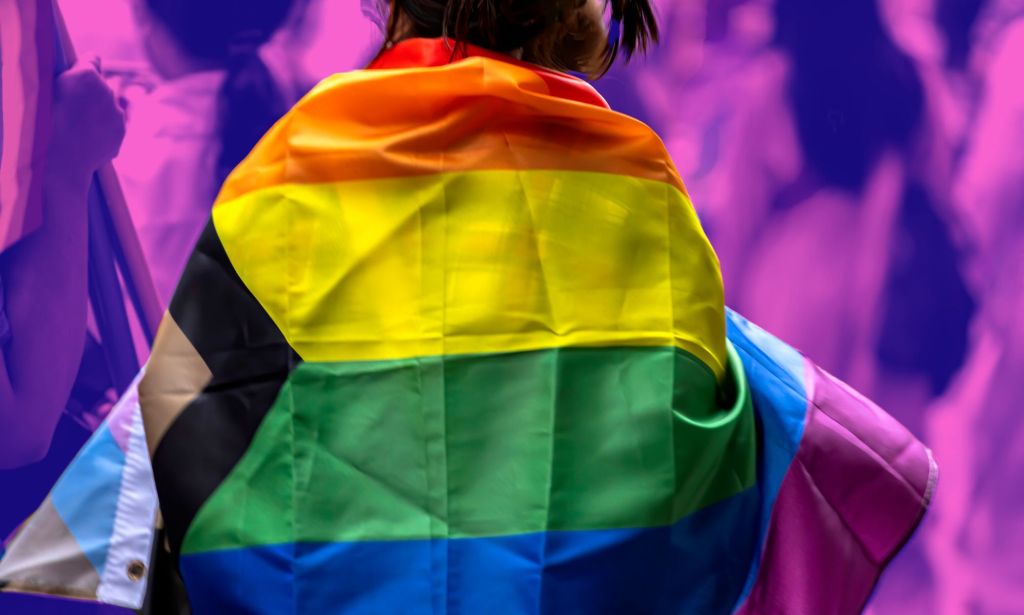IDAHOBIT 2024: Why standing up to anti-LGBTQ+ hate is more vital than ever

International Day of Homophobia, Biphobia and Transphobia takes place every year on the 17th of May. (Getty Images/PinkNews)
As anti-trans rhetoric continues, the theme for 2024’s International Day against Homophobia, Transphobia and Biphobia (IDAHOBIT) is “No one left behind: equality, freedom and justice for all.”
IDAHOBIT traces its roots back to 17 May 1990, when the World Health Organization (WHO) declassified homosexuality as a mental disorder.
This milestone led, in 2004, to the creation of the day as a means of raising awareness of LGBTQ+ rights violations and to advocate for queer rights globally.
Despite significant progress, data from the ILGA World Database indicates that LGBTQ+ people continue to face challenges in accessing their basic rights.
Progress for some, setbacks for others
Currently, 62 UN member states criminalise consensual same-sex relations, either by law or in practice. At least 59 countries have restrictions on freedom of expression related to sexual and gender diversity issues, and in the past two years there has been an acceleration in the enacting and debating of such provisions.
While laws protecting individuals from hate crimes based on sexual orientation exist in 59 UN member states, only 38 do so based on gender identity, nine when it comes to gender expression, and five for sex characteristics.
16 member states have implemented bans on so-called conversion therapies at the national level, while nine have introduced nationwide restrictions on unnecessary interventions for intersex youth.
17 allow for legal gender recognition based on self-determination at the national level, and 35 have legalised marriage equality.

Meanwhile, a delay in banning conversion practices, the government’s trans guidance for schools to forcibly out transgender, non-binary and gender-non-conforming students to their parents, and the NHS announcing that trans women will be banned from female wards in England mean the UK is now ranked as only the 16th friendliest country in Europe for LGBTQ+ people.
Born free and equal in dignity
Amid progress and pushback, the theme of IDAHOBIT 2024 is a call for solidarity, and for everybody to unite in creating a world with social justice, where no one is left behind. Equality, freedom and justice form the foundation of a democratic society where everyone is valued, respected and celebrated.
“All human beings are born free and equal in dignity and rights” represents a fully fulfilled promise for everyone, including people of diverse sexual orientations, gender identities and expressions, and sex characteristics.
By addressing these forms of discrimination collectively, IDAHOBIT aims to foster understanding, empathy and acceptance of LGBTQ+ people worldwide.
Here are some helpful ways to show your support for the LGBTQ+ community on IDAHOBIT (and all year).
Educate yourself
Asking your queer friends and family about their experiences is great, but take the time to learn about the challenges faced by LGBTQ+ individuals. Read books, watch documentaries and listen to personal stories to gain a deeper understanding of queer issues.
Raise awareness
Use your platform, whether it’s on social media, in your community or at your workplace, to raise awareness about IDAHOBIT and the importance of LGBTQ+ rights. Share informative articles, infographics or personal anecdotes to spark conversations and encourage empathy.
Advocate for LGBTQ+ rights
Support organisations and initiatives that advocate for LGBTQ+ rights and equality. This could involve signing petitions, attending rallies or contacting policymakers to push for inclusive policies and legislation. Money certainly helps, so consider annual donations to charities that positively affect the queer community.
Challenge discrimination
Speak out against homophobia, biphobia and transphobia whenever you encounter it. Whether it’s confronting derogatory language or standing up against discriminatory practices, your actions can make a difference in creating a more inclusive society.
Be an ally
Show your support for the LGBTQ+ community by being an active ally. Listen to LGBTQ+ voices, amplify their stories and stand in solidarity with them in their fight for equality and acceptance.
Create and be part of safe spaces
Foster environments where LGBTQ+ individuals feel safe, respected and included. Whether it’s in your workplace, school or social circles, always strive to create spaces free from discrimination and judgment.
Practice empathy
Treat LGBTQ+ individuals with the same empathy, respect and dignity as you would anyone else. Recognise and celebrate the diversity within the LGBTQ+ community, and embrace the uniqueness of each individual.
How did this story make you feel?
